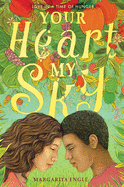
Love blossoms and endures during Cuba's period of famine in Margarita Engle's heartrending novel in verse, Your Heart, My Sky.
It's the summer of 1991 and the Pan American Games are being held in Havana. Liana and Amado are teens living in a rural part of the country and going hungry while resources are funneled into the city. In Liana's words, "We are like an outer isle off the shore of another island. Forgotten." When her family's rations are depleted, she sips on sweetened water "because sugar is the only food... abundant enough to share." Meanwhile, Amado is searching for freedom. Both Liana and Amado skipped "la escuela al campo," a summer of "forced so-called-volunteer farm labor." This rebellion could be costly, but they're at war with hunger. The teens are brought together by Paz, a dog that functions as a stray cupid. They scavenge the beach for seaweed, frogs and dead crabs, but need something long term, so they visit Amado's abuela, who is "almost blind from malnutrition." His grandparents teach the teens how to farm vegetables--which could land them all in jail seeing as even "roadside bananas belong to the government."
At times, Your Heart, My Sky feels like dystopian fiction, where teens risk their lives to quell cramping bellies. Former Young People's Poet Laureate Engle (With a Star in My Hand; Soaring Earth), who describes witnessing similar events firsthand in her author's note, doesn't back down from the harrowing depiction of this very real time, historically known as "the special period in times of peace." Liana and Amado's revolutionary summer is open-ended, leaving the reader with a mix of melancholy and luminous hope. --Zoraida Córdova, author and freelance book reviewer

